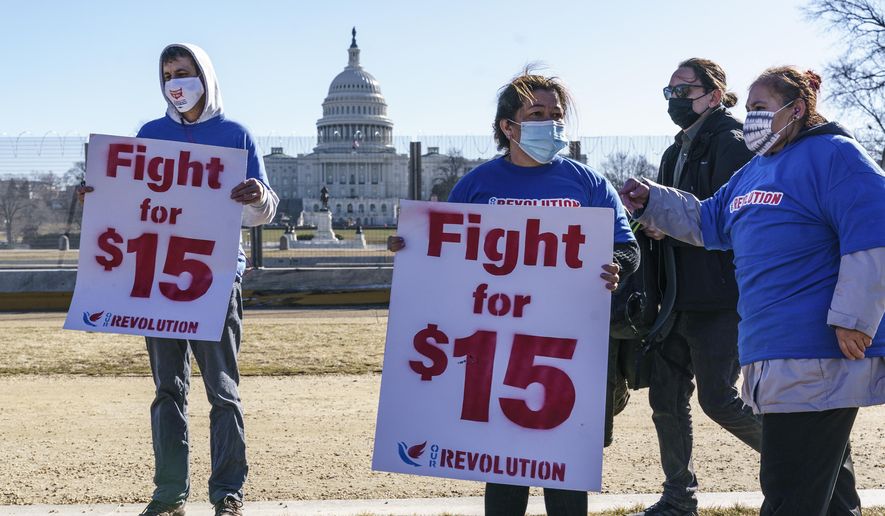Senate Democratic leaders failed to get a minimum wage hike to $15 per hour in the $1.9 trillion COVID-19 relief package, as the chamber took up a flurry of amendments Friday to President Biden’s top legislative priority.
The minimum wage hike failed in a 58-42 vote, though the Democrats who run the chamber delayed recording the vote.
It would take 60 votes for the measure to survive but eight Democrats joined the Republicans in opposing the move.
The failed vote was a blow to the party’s far-left wing. Self-described democratic socialist Sen. Bernard Sanders of Vermont declared: “Right now it is absolutely imperative that we raise that minimum wage!”
Senate Majority Leader Charles E. Schumer, New York Democrat, continued to hold the vote open for more than four hours while backroom negotiations on other amendments took place, including pressure to keep the Democratic ranks together on extending jobless benefits.
Those negotiations appeared targeted at Sen. Joe Manchin III of West Virginia, who is the most conservative Democrat in the chamber. He also voted against the increase of the federal minimum wage to $15 per hour from the current $7.25.
The other Democratic defections on the minimum wage increase were Sen. Tom Carper of Delaware, Sen. Chris Coons of Delaware, Sen. Kyrsten Sinema of Arizona, Sen. Jon Tester of Montana, Sen. Jeanne Shaheen of New Hampshire and Sen. Maggie Hassan of New Hampshire. Sen. Angus King of Maine, an independent who caucuses with the Democrats, also voted no on the wage increase.
“I think they’re trying to wear down Joe Manchin, who is intent on making sure we don’t spend more than we have to,” Sen. Mitt Romney, Utah Republican, told reporters at the Capitol.
A point of contention is the amount of extra money added to unemployment checks. The House passed an extra $400 per week increase but moderates in the Senate cut it down to a $300 boost.
The Senate is expected to vote on a slew of amendments until late Friday and possibly Saturday before putting the entire relief package to a vote. The legislation would then head back to the House, Speaker Nancy Pelosi’s chamber, which is expected to vote next week to send it to Mr. Biden.
The legislation gives $1,400 to most Americans and funding to state and local governments, schools, the airline industry, and tax breaks from lower earners. There’s also funding for COVID-19 vaccinations and testing.
The upper chamber began debate on the massive relief bill Thursday, with Vice President Kamala Harris casting the tie-breaking vote to begin debate.
Republicans oppose the bill’s massive price tag and scattershot spending. They said vaccines are being distributed and the economy is already beginning to rebound, pointing to Friday’s unemployment report that showed 379 thousand jobs added to the economy last month.
• S.A. Miller can be reached at smiller@washingtontimes.com.
• Alex Swoyer can be reached at aswoyer@washingtontimes.com.




Please read our comment policy before commenting.